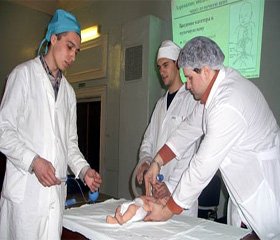Журнал «Здоровье ребенка» 6 (49) 2013
Вернуться к номеру
Experience of preparation primary care specialists of medical and sanitary aid in the context of integrated management of childhood illness in teaching pediatrics to junior students
Авторы: Fofanov O.D. - Ivano-Frankivsk National Medical University, Ukraine
Рубрики: Семейная медицина/Терапия, Педиатрия/Неонатология
Разделы: Справочник специалиста
Версия для печати
One of important tasks in reformation of health protection in Ukraine is improvement of primary medical-sanitary aid (PMSA) and improving the quality of preparation specialists for work in this link of health protection. Especially it touches the professionally prepared personnel for the provision of medical care to the children at the level of PMSA.
WHO, UNICEF and many other organizations worked out and inculcated in many countries the strategy of "Integrated Management of Childhood Illness" (IMCI) for children in age younger 5 years, priority direction of that is a primary medical-sanitary aid. Without regard to that main reason of development of strategy of IMCI was a necessity of provision to the children of clinical help, it also pays attention to such pediatric aspects as a supervision, feed of healthy children, immunization, physical and psychomotor development, prophylaxis of diseases, active bringing in of family and society members to provision of medical care to the children.
For today there are no recommendations on including of IMCI strategy in educational programs at training of medical assistant's and doctors personnels as basic specialists of PMSA. In some medical universities of Ukraine separate questions of IMCI have already being included in the programs at the final courses of university and at the postgraduate stage of studies. But in our opinion it is expedient to teach the methodology of some principles of IMCI exactly at junior courses. Most recommendations of IMCI, in particular question of supervision, feeding, physical and neuropsychic development, estimation of the condition of child and others, included in the typical programs of such disciplines as propedeutics of paediatrics, semantic modules "Supervision of children" and "Basic duties and professional actions of a nurse of pediatric department".
Introduction of strategy of IMCI at the chair of children’s surgery and propedeutics of paediatrics began with the studies of teachers with the use not only materials of WHO, UNICEF (manuals, guidance) but also presentations and recommendations of educational seminars. A few important stages that must be fulfilled by a medical worker at the first examination of child are indicated in the guidance of IMCI.
Among them the main place is occupied by taking the history and dealing with a mother or with a person who looks after a child, teaching and consulting the mother on questions of feeding and supervision upon healthy and sick children. However, methodological approaches to the capture of the effective communicating with a patient and his family at present in practice in some way differ of the principles of IMCI. Mostly history is taken the on standard charts without application of communicative skills and that is why get less information about the course of the disease and conditions of care of a child in the family.
Introduction of strategy of IMCI in educational process at the chair was begun with that students were acquainted with an aim of its working out and tasks. During practical studies the teachers demonstrate to the students methodology of consulting of mother on the care of a child, further on – give a tusk to check up to the students, as she mastered their implementation. To the students beginning with a 2nd year at practical part of the study is renewed methodology of business games, during which students carry out the role of doctor and patient or his mother in turns. For independent work the students are given a tusk to prepare texts of conversations with a mother and consultations depending on the theme of the study. At the estimation of practical part at every practical study we take into account the ability of student to communicate with a child and his mother. In the context of strategy of IMCI at the estimation of the condition of a child it is envisaged to determine the stages of the urgent sorting, that consists in the rapid estimation of the condition of children after a certain algorithm for reviling urgent signs that demand urgent interference; priority signs that require paying priority attention and realization without a delay of necessary curative and diagnostic measures. While studying of semiotics of children's diseases and determining separate syndromes at lectures and practical studies paid attention to necessity of application of methodology of a stage sorting of patients according to strategy of IMCI.
Thus, in order a student could master recommendations of strategy of IMCI and use it at senior courses, on the postgraduate stage of studies and in the future - in practical work, the lasting training that it follows to begin with junior courses is needed, when students first come to clinical chairs.

